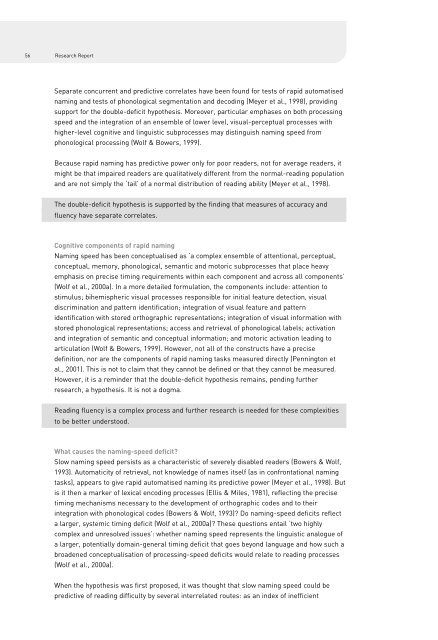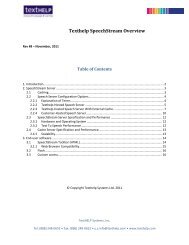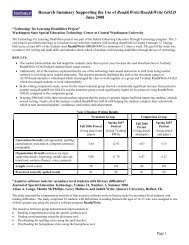01 NRDC Dyslexia 1-88 update - Texthelp
01 NRDC Dyslexia 1-88 update - Texthelp
01 NRDC Dyslexia 1-88 update - Texthelp
Create successful ePaper yourself
Turn your PDF publications into a flip-book with our unique Google optimized e-Paper software.
56<br />
Research Report<br />
Separate concurrent and predictive correlates have been found for tests of rapid automatised<br />
naming and tests of phonological segmentation and decoding (Meyer et al., 1998), providing<br />
support for the double-deficit hypothesis. Moreover, particular emphases on both processing<br />
speed and the integration of an ensemble of lower level, visual-perceptual processes with<br />
higher-level cognitive and linguistic subprocesses may distinguish naming speed from<br />
phonological processing (Wolf & Bowers, 1999).<br />
Because rapid naming has predictive power only for poor readers, not for average readers, it<br />
might be that impaired readers are qualitatively different from the normal-reading population<br />
and are not simply the ‘tail’ of a normal distribution of reading ability (Meyer et al., 1998).<br />
The double-deficit hypothesis is supported by the finding that measures of accuracy and<br />
fluency have separate correlates.<br />
Cognitive components of rapid naming<br />
Naming speed has been conceptualised as ‘a complex ensemble of attentional, perceptual,<br />
conceptual, memory, phonological, semantic and motoric subprocesses that place heavy<br />
emphasis on precise timing requirements within each component and across all components’<br />
(Wolf et al., 2000a). In a more detailed formulation, the components include: attention to<br />
stimulus; bihemispheric visual processes responsible for initial feature detection, visual<br />
discrimination and pattern identification; integration of visual feature and pattern<br />
identification with stored orthographic representations; integration of visual information with<br />
stored phonological representations; access and retrieval of phonological labels; activation<br />
and integration of semantic and conceptual information; and motoric activation leading to<br />
articulation (Wolf & Bowers, 1999). However, not all of the constructs have a precise<br />
definition, nor are the components of rapid naming tasks measured directly (Pennington et<br />
al., 20<strong>01</strong>). This is not to claim that they cannot be defined or that they cannot be measured.<br />
However, it is a reminder that the double-deficit hypothesis remains, pending further<br />
research, a hypothesis. It is not a dogma.<br />
Reading fluency is a complex process and further research is needed for these complexities<br />
to be better understood.<br />
What causes the naming-speed deficit?<br />
Slow naming speed persists as a characteristic of severely disabled readers (Bowers & Wolf,<br />
1993). Automaticity of retrieval, not knowledge of names itself (as in confrontational naming<br />
tasks), appears to give rapid automatised naming its predictive power (Meyer et al., 1998). But<br />
is it then a marker of lexical encoding processes (Ellis & Miles, 1981), reflecting the precise<br />
timing mechanisms necessary to the development of orthographic codes and to their<br />
integration with phonological codes (Bowers & Wolf, 1993)? Do naming-speed deficits reflect<br />
a larger, systemic timing deficit (Wolf et al., 2000a)? These questions entail ‘two highly<br />
complex and unresolved issues’: whether naming speed represents the linguistic analogue of<br />
a larger, potentially domain-general timing deficit that goes beyond language and how such a<br />
broadened conceptualisation of processing-speed deficits would relate to reading processes<br />
(Wolf et al., 2000a).<br />
When the hypothesis was first proposed, it was thought that slow naming speed could be<br />
predictive of reading difficulty by several interrelated routes: as an index of inefficient
















